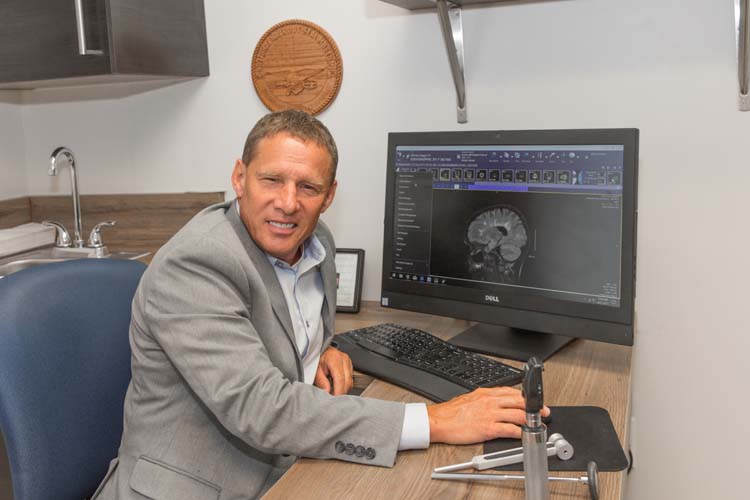
For the first time, researchers have made an association between chronic pain and memory loss in older adults, indicating that such pain could somehow result in brain changes that affect cognitive function.
The study was published in a June issue of JAMA Internal Medicine. The team, from UC-San Francisco, analyzed data from 10,000 participants, all of whom were aged 60 or older. When tracked over a course of 10 years, those who said they were persistently troubled by moderate or severe pain declined 9.2 percent faster in tests of memory, compared with those who did not report having such pain.
Vero Beach neurologist S. James Shafer is familiar with this study and agrees there is slightly more cognitive impairment in those suffering from chronic pain. However, he notes that there was no significant increase in dementia in chronic pain sufferers, and that it’s important to distinguish the two.
“Cognitive impairment is a noticeable and measurable decline in cognitive function. Dementia is more severe and impacts the person’s ability to interact with the world personally, socially, or professionally,” Shafer says.
Elizabeth Whitlock, MD, MSc, a postdoctoral fellow at UC-San Francisco and lead author of the study, says the findings point toward new ways of thinking about how to protect older people from the cognitive insults of aging. “Elderly people need to maintain their cognition to stay independent. Up to one in three older people suffer from chronic pain, so understanding the relationship between pain and cognitive decline is an important first step toward finding ways to help this population.”
There are differing opinions among experts about exactly when pain becomes chronic, but it’s safe to say that pain that lasts for six months or more has crossed over from acute (short term) to chronic.
Chronic pain can sometimes be traced to an old injury or an underlying condition such as osteoarthritis, multiple sclerosis, fibromyalgia or shingles. There is also neuropathic pain, in which the nerve fibers themselves may be damaged or dysfunctional. And then there are the cases when chronic pain has no apparent cause; the medical term for this is “idiopathic.”
There are separate yet overlapping reasons for the association between chronic pain and dementia:
• Vero’s Dr. Shafer says that opioids (and other types of pain medications) work by blocking pain receptors throughout the nervous system; and by doing so can block receptors that are involved in cognitive function.
• The experience of chronic pain itself, from a biological perspective, may compromise the brain’s ability to form memories and also impair other cognitive functions.
• Chronic pain can also have a non-biological (but just as real) impact. Dr. Shafer says, “Chronic pain takes up a lot of the sufferer’s attention. It is distracting and can affect the ability to process and retain information.”
• It is known that the emotional stress of being in pain activates stress-hormone pathways in the body that have been associated with cognitive decline.
Many current pain management therapies, in addition to being addictive, are not always effective, and doctors are continually seeking ways to provide their patients with relief.
UC-San Francisco’s Whitlock says that patients who are suffering with chronic pain, and may be experiencing a more rapid cognitive decline as a result, can be helped by a number of techniques and strategies, such as assistive devices, physical and occupational therapy, and “mindfulness” meditation techniques.
All are geared toward increasing “self-efficacy” (a belief in one’s ability to accomplish a task or succeed in a specific situation) and curbing the emotional impact of chronic pain.
Dr. Shafer agrees that “alternative” pain management techniques can be effective, if correctly tailored to the individual. He says, “There are good things out there, like hypnotherapy and acupuncture. And believe it or not, good old-fashioned exercise can also be a big help.”
Biofeedback is another technique that Dr. Shafer says can be helpful in the management of pain. The person is connected to electrical sensors that provide feedback about body functions, such as heart rate. This feedback helps the person make subtle changes in their body, such as relaxing certain muscles, which helps to reduce pain.
Dr. Shafer wants the community to know that pain, especially in older people, can be a manifestation of depression, and sufferers should talk to their doctor about whether depression could be a factor in their chronic pain, as there are treatment options for depression that could end up reducing pain.
Dr. Shafer sees patients and conducts research at the Vero Beach Neurology and Research Institute, located at 1040 37th Place, Suite 201, in Vero Beach. The phone number is 772-492-7051.



